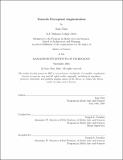Towards Perceptual Augmentation
Author(s)
Chin, Sam
DownloadThesis PDF (16.66Mb)
Advisor
Paradiso, Joseph A.
Terms of use
Metadata
Show full item recordAbstract
This thesis explores the concept of perceptual augmentation, focusing on expanding human sensory capabilities beyond their biological limitations. It challenges traditional approaches to sensory enhancement by emphasizing the importance of perception over mere sensory input. Drawing inspiration from the diverse sensory abilities found in nature, the research aims to develop methods for meaningful augmentation of human perception that can impact daily life. The study adopts an ecological approach to perceptual augmentation, grounded in Gibsonian ecological psychology. Key principles include providing correct mental models of augmentation devices, leveraging environmental training and natural tasks, emphasizing multisensory interfaces with sensorimotor feedback, and creating affordances that mimic the natural world. This approach seeks to facilitate perceptual learning through natural interaction with the environment, rather than relying on extensive explicit training.
The thesis presents early work in exploring and evaluating individual principles of this ecological framework for perceptual augmentation. While acknowledging the gap between the proposed theoretical approach and current research outcomes, the studies conducted focus on augmenting perception for specific tasks such as pitch interval perception, pilot situation awareness, and sleep staging. The research does not yet demonstrate a generalized, "all-purpose" augmented sense, but lays groundwork for future investigations, including a proposed experiment to mitigate age-related hearing loss using the developed principles.
Date issued
2024-09Department
Program in Media Arts and Sciences (Massachusetts Institute of Technology)Publisher
Massachusetts Institute of Technology